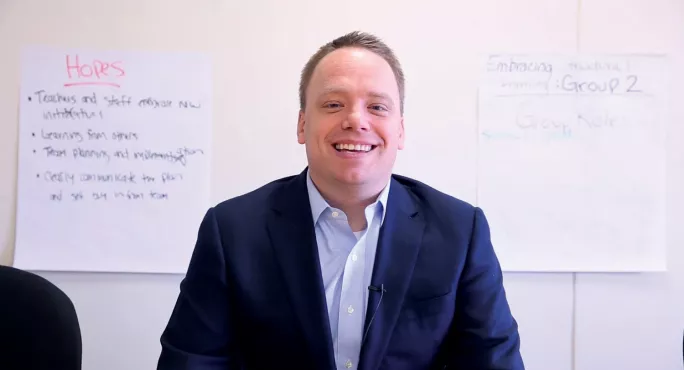- Home
- ‘There is no such thing as an average student - everyone must learn at their own pace’
‘There is no such thing as an average student - everyone must learn at their own pace’

Before Todd Rose became a Harvard professor, he was an educational failure: a high-school dropout working minimum wage jobs.
After he turned his life around in night school and college, finishing top of his class and winning a graduate school place at Harvard, it became pretty clear that he had not been held back through lack of ability.
So it was natural to ask, how many other students like him were being let down by their schooling? And how could the system do better for them?
Answering those questions has become part of his life’s work at Harvard’s Laboratory for the Science of the Individual and non-profit organisation the Center for Individual Opportunity.
- When is GCSE results day 2017?
- How to support your students on GCSE results day
- How to tell your exam results day story: A guide for headteachers
Deviation from the mean
His conclusion, set out in his recent book, The End of Average, is that mass education has relied on crude standardisation. It doesn’t reflect students’ individuality, but instead a tendency to rank individuals according to their deviation from the mean.
“We’re so conditioned to think that the only way you can understand someone is by comparing them to someone else,” he says.
Basing educational practice around the average student is critically misleading, he warns, because no one is average. He cites the example of US Air Force pilots, who suffered a spate of unexplained accidents. The cause was eventually traced to the design of the plane’s cockpits, which had been based on the average measurements of pilots in 1950. The problem? No individual pilot fitted the average. When they created an individually adjustable cockpit instead, the crashes stopped.
Modern data science is revealing that the profiles of individuals are far more complex than averages capture, whether it comes to body measurements or educational performance, Rose argues. Instead, our profiles are “jagged” and highly specific: for example, we might appear average at maths, but actually excel in algebra while at the same time struggling with statistics.
“We know there’s no such thing as an average kid,” he says. “If you list the attributes that matter, in math class or in the student as a whole, those dimensions just don’t correlate with each other. Every kid has this jagged profile.”

But our ranking against averages can have dramatic consequences for students’ educational experience. Professor Rose contrasts his early experience in college when he was thought to be a low-achieving student with his experience after he begged for a place on the honours programme.
“When I was in the honours programme, I got so many more resources than any other kid at that school got,” he says. “Not just material resources but respect and the way that people look at you - that leads to a qualitatively different experience.”
Rose proposes three principles to improve our thinking about individuals. The first is this idea of jagged profiles: our strengths and weaknesses are complex and highly specific.
The second is that traits are a myth: instead, he suggests that individuals all display different characteristics in different circumstances. Rose’s own experience of schooling was influenced by an incident in which he was labelled aggressive - just one example of the way schools risk stereotyping their students.
Lastly, he says that all pathways to success are individual and eccentric. Take learning to walk: aggregate data told scientists there was a “normal” sequence, involving crawling then walking. But later studies show there are at least 25 pathways for learning to walk, and that children often go back and forth between stages. This is typical of the way we learn, Rose suggests.
Practical application
How can schools apply these insights? Rose believes one way is to use their collective purchasing power to pressure textbook companies for resources that can be personalised to each student’s needs, something that the digital revolution makes possible.
But it’s the idea that pace of learning is individual and has no relation to ability in the long-term that he believes is crucial for schools. He cites Benjamin’s Bloom’s experiments with self-paced learning and individual tuition, where 90 per cent of students achieved as much as the top 20 per cent in ordinary classes. “If you fix a pace on average, you are just destroying talent,” Rose says.
He advocates competency-based learning, which allows students to progress only when they have mastered each skill and element of knowledge, and to skip ahead with material they find easy. Rose takes his examples from universities, but the model has been adopted by the Chugach School District in rural Alaska: after five years of competency-based education, 70 per cent of students took college entrance exams. In the previous 20 years, just one student had gone to college.
But competency-based education has been criticised for being hard to square with creativity or open-ended inquiry. Amy Slaton, professor of history at Drexel University in Philadelphia, has argued that it is being promoted as an instrument of “economy and brevity”, not for educational benefits.
Rose fears the opposite: that personalised, self-paced education will be adopted by the wealthy before state education adapts, allowing the rich to entrench their advantages. Crucial to his vision is providing an education that allows talent to emerge from anywhere.
“My view of potential is, let’s stop thinking that we can predict it in any one individual and focus our efforts right now on creating highly favourable conditions for as many people as possible,” he says. “And let’s see what happens.”
Todd Rose key facts
- Job title: Director of the Mind, Brain, and Education programme at the Harvard Graduate School of Education and head of Harvard’s Laboratory for the Science of the Individual
- Co-founder: Center for Individual Opportunity
- Author of: The End of Average
- Other roles: Editorial board, Journal of Attention Disorders; expert panel, Task Force on the Future of Educational Neuroscience, National Science Foundation; expert panel, Working Group on Explorations in Learning and the Brain, Netherlands Organisation for Scientific Research
- Key interests: According to his Harvard page, “the intersection of the science of individuality and the practice of personalisation in education”
Keep up to date with all the latest GCSE news, views and analysis on our GCSE hub.
Find out what colleagues are chatting about in your discipline by visiting the subject based forums in the Tes Community or you can join in the conversation about GCSE results day.
Keep reading for just £1 per month
You've reached your limit of free articles this month. Subscribe for £1 per month for three months and get:
- Unlimited access to all Tes magazine content
- Exclusive subscriber-only stories
- Award-winning email newsletters


